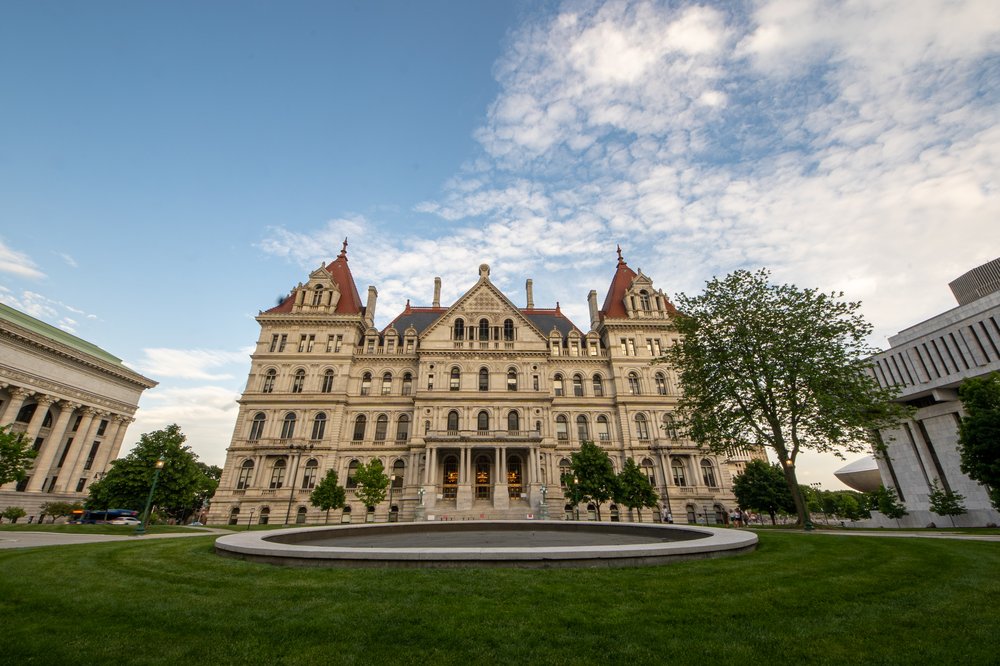NY lawmakers draft gun laws in response to Supreme Court, which could restrict guns in ‘sensitive places’ like schools, transit
June 23, 2022, 3:19 p.m.
Gov. Kathy Hochul said new measures are focusing around the definition of "sensitive areas"

New York Gov. Kathy Hochul and state lawmakers are negotiating a plan to restrict firearms in “sensitive places” like schools – and possibly the New York City subway system – after a U.S. Supreme Court ruling Thursday made it easier to legally carry guns in public.
Hochul said Thursday that she intends to soon summon the Legislature back to the state Capitol to take up a series of gun-control bills in direct response to the court’s decision, which found a 1911 state law violated the U.S. Constitution by requiring anyone seeking a concealed carry permit to show they have a specific need for self-defense.
“We have been working with a team of experts – legal experts from all over this country, and organizations like Everytown, true leaders – to make sure that we are prepared,” Hochul said Thursday during a news conference in her Manhattan office.
She continued: “I'm prepared to call the Legislature back in a session to deal with this. We've been in contact with the leadership. We're just looking at dates.”
The Supreme Court’s 6-3 decision fell along conservative-liberal lines and was authored by Justice Clarence Thomas.
The decision was wide-reaching and absolute, finding that New York’s law violated the Fourteenth Amendment’s equal protection clause. Thomas also wrote the state was preventing citizens with “ordinary self-defense needs from exercising their Second Amendment right to keep and bear arms in public for self-defense.”
But Hochul said she and state lawmakers will enact a series of new laws that are meant to counteract the ruling’s potential negative consequences.
Specifically, prior court precedent allows the restriction of guns in certain “sensitive places.” Hochul said she and lawmakers are discussing a measure that would clearly lay out a list of sensitive places where guns aren’t allowed. While the language is yet to be negotiated, Hochul said she wants to see the subway system on the list while also mentioning areas like schools and restaurants.
But Thomas’ written opinion already seemed to limit what the state can and can’t do with such restrictions. Specifically, he made clear New York City couldn’t just name an entire borough like Manhattan as a “sensitive place.”
“(T)here is no historical basis for New York to effectively declare the island of Manhattan a ‘sensitive place’ simply because it is crowded and protected generally by the New York City Police Department,” Thomas wrote.
Other measures Hochul said are under consideration include:
- Changing the permitting process to require specific training in order to obtain a concealed-carry permit.
- Allowing businesses and private property owners to “protect themselves” by prohibiting concealed weapons on their grounds.
Hochul said the state had been preparing for the eventuality of the court’s decision, and that her team is negotiating the final bill language with legislative leaders.
“Stay tuned,” Hochul said. “We’re just getting started here.”
The legislative leaders signaled they’re more than open to returning to the Capitol to deal with the ruling. State lawmakers had just ended their annual legislative session in June and weren’t scheduled to return to Albany until January.
Senate Majority Leader Andrea Stewart-Cousins said lawmakers must “stand united to address the laws that keep allowing guns to fall into the wrong hands.”
“New York will rise up to this latest challenge to pass additional gun safety legislation,” she said in a statement.
Assembly Speaker Carl Heastie, D-Bronx, called the ruling a “devastating blow to Americans across the country who are tired of living in constant fear of gun violence.”
Gunowner-rights groups, however, have shown they’re plenty willing to challenge the state’s gun laws in courts, and any attempts by the Legislature to dull the Supreme Court ruling court could draw a lawsuit.
The New York State Rifle and Pistol Association was the lead plaintiff in the court case decided Thursday.
Gerard Kassar, chairman of the state Conservative Party, called the decision a “step in the right direction for millions of Americans who’ve been arbitrarily denied their Constitutional right to self-protection for decades.”
“This ruling will give law-abiding New Yorkers the option of protecting themselves with a firearm in a state with significant crime issues,” he said in a statement. “Violent criminals have never hesitated to carry guns illegally obtained. Maybe they’ll think twice now before committing additional crimes.”
It remains to be seen how quickly the Legislature will return to the Capitol. But it could be complicated by the state’s political calendar.
New York’s primaries for governor, lieutenant governor and state Assembly are set for Tuesday, with Hochul and a number of Assembly members facing intra-party challenges.
Hochul said the primary election will not be a consideration for when she brings back lawmakers. She said she is currently discussing potential dates with legislative leaders.
“We're not making decisions based on primaries, I will tell you that for sure,” Hochul said.
What the U.S. Supreme Court gun ruling could mean for mass transit in New York City Supreme Court strikes down New York’s tough concealed-carry handgun law: What we know now